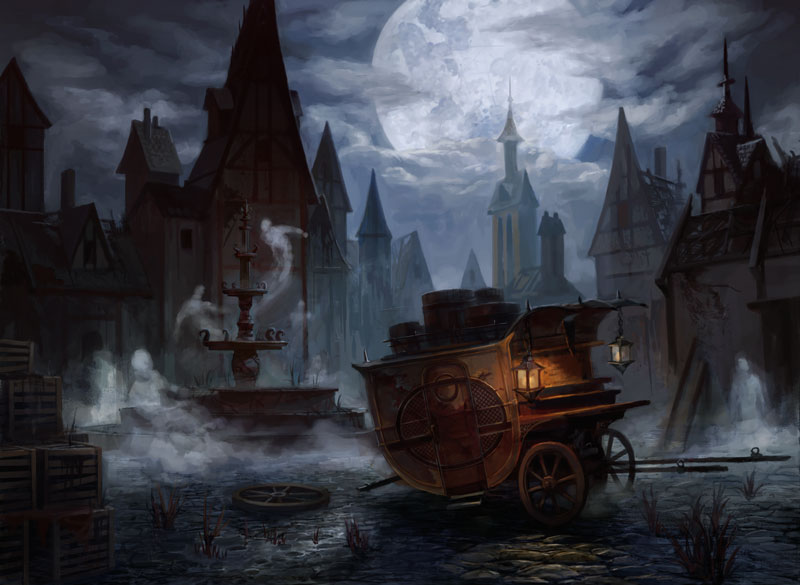Geist (5e Race)
Geists[edit]
Geists are a unique form of a ghost or other spirit in that they have elected to turn away from the Blessed Sleep, a form of the afterlife where the souls find eternal rest, rather than being prohibited from it due to a geist's anguish or regret overcoming the pull toward the Æther.

|
|---|
| MtG: Ghost Quarter by Peter Mohrbacher |
History[edit]
Geists were once like most other spirits, malevolent. Manifesting only because of a grudge or regret powerful enough to disturb the Blessed Sleep, which bonded their essence to the world of the living, making them a creature no longer alive or dead. Some geists still retain this malevolence·, but these malevolent spirits are counterbalanced by many benevolent and neutral geists. Geists take many forms, some are protective spirits of ancestors, from nurturing apparitions of family members who have passed on to inscrutable ghosts who seem to want to continue whatever duty they had in life, while others are vengeful creatures bent on resolving conflicts they couldn't resolve in life.
Material and Immaterial
Geists exist in the space between the material and Æthereal realms, so to varying degrees they possess qualities of both worlds. Thus some are able to walk through walls and then slash open throats. Others use the beliefs of the living against them; victims believe in the spirit so completely that they harm themselves with the power of their own mind. Some use fear to literally scare the victim to death. Some spirits use cold to freeze opponents or reduce their temperatures down to hypothermic levels when humans become lost on the moors or wander too far into the bogs. Other, more powerful ghosts use their force of will or emotion to condense matter (called ectoplasm) around their hands or weapons for a split second when they attack. Some use psychokinetic power to wrap objects around them (e.g., brambles, chains, spikes, glass, etc.), and then wield them against their foes.
Lawful or Good Aligned Geists
Many lawful-aligned geists are harmless or even protective spirits of dead family and friends who haunt the living out of a sense of duty, fealty, responsibility, or love. Malevolent lawful-aligned geists do exist, however, and are usually twisted by guilt, feelings of failure, or un-righted wrongs. Some are ghosts of fallen soldiers that still patrol the moors, looking for their vanquishers.
Evil Aligned Geists
These geists eternally hunger for life, power, or the settling of a wicked grudge. These are spirits that must be appeased by offerings of food, goods, and even blood. If not appeased, these geists can be responsible for a disease, accidents, and even death.
Chaotic Aligned Geists
These spirits have attached themselves to rampant emotions, unfulfilled desires, and thirsts for revenge that were frustrated during life. They can manifest as blood dripping from statues, whirls of dust on roads, minor rockslides on hillocks, cliffs, and mountainsides, and, in the case of possession, as sudden mania or murderous rage. The ghosts of the unavenged are some of the most dangerous geists, sometimes appearing as living fire or as "blood mist" entities that engulf a hapless victim and inflict cuts and welts that are slow to heal.
Nature Based Geists
Some geists long to be reconnected with the natural world that they revered in life. Energies within the woods that have been called into being by druids or other nature-based magic users take on a form of entwined roots and brambles that coat their Æthereal bodies. Some of these spirits attach themselves to animals, plants, and landforms, imbuing them with special power or mutating them into strange, otherworldly entities. If the spirits that inhabit landforms are not appeased, it can often result in blight, crop failure, and famine.
Mind Based Geists
Some geists are projections of the animating principles of the mind. Vicious or obsessive thinking, as well as collective human memories, come to life by attracting enough latent aether around them to become autonomous entities. They carry on as obsessive ghosts—repeated knocking, patterning, arranging, stacking, marking, etc. They can also possess one's mind and cause repetitive movements, speech, epilepsy, obsessive behavior, schizophrenia, and other such maladies of the mind. These are also the geists most drawn to the water, storms, frost, and mist—even the mist of the breath.
Geist Traits[edit]
| Geists are a unique form of a ghost or other spirit in that they have elected to turn away from the Blessed Sleep, a form of the afterlife where the souls find eternal rest, rather than being prohibited from it due to a geist's anguish or regret overcoming the pull toward the Æther. Ability Score Increase. Your Charisma or Intelligence score increases by 2, and your Wisdom increases by 1. However, your Strength score decreases by 2, and your Dexterity decreases by 1. Age. Geists don't age, as a form of undead without a physical body they can last for as long as they continue to hold onto this realm of the living but most will dissipate after about a 1000 years. Alignment. Geists tend to retain the alignment they had in their life or be within one factor of their original alignment. Size. The height of a geist varies based on the geist's original race, however, regardless of your original race. Your size is Medium. Speed. You have a base walking speed of 30 feet. |
| Ethereal. Your ethereal form grants you a host of benefits. Your Armor Class is calculated using your Charisma or Intelligence instead of your Dexterity. While unarmored your Armor Class is equal to 10 + your Charisma or Intelligence modifier. You are resistant to nonmagical bludgeoning, piercing and slashing damage. In addition, you may free swap your walking speed for a hover speed equal to your walking speed. And you can pick up objects as normal, but if an object was moving and you try to grab it, it stays for a bit, but then goes through you (example: if something is thrown, you can catch it as normal, but after a few seconds, it will pass through you, same with other body parts, this also applies to a rolling object). |
| Ethereal Sight. A geist can see 60 feet into the Ethereal Plane when it is on the Material Plane, and vice versa. You can see in dim light within 60 feet of you as if it were bright light, and in darkness as if it were dim light. You can't discern color in darkness, only shades of gray. |
| Ghostly Touch. A gheist does not use physical strength to lift objects due to their form, instead, they use their influence over the ethereal. You may use your Charisma or Intelligence score in place of your Strength or Dexterity scores and may manipulate objects you can see within 5 feet of you. For example, you would make a Charisma or Intelligence (Athletics) check to grapple a target instead of a Strength (Athletics). |
| Incorporeal Movement. Like most spectral undead, physical structures do not impede you. You can move through other creatures and objects as if they were difficult terrain. You take 1d10 force damage if you end your turn inside an object. |
| Poltergeist. You know the thaumaturgy cantrip. Charisma or Intelligence is your spellcasting ability for it. |
| Possession. You gain the ability to possess a humanoid within 5 feet of you. The humanoid must succeed a Charisma or Intelligence saving throw or become possessed. You then disappears, and the target is incapacitated and loses control of its body. You now control the body but you can't deprive the possessed target of awareness. You can't be targeted by any attack, spell, or other effect, except ones that turn undead, and you retains your alignment, Intelligence, Wisdom and Charisma scores. You otherwise uses the possessed target's statistics but doesn't gain access to the target's knowledge, class features, or proficiencies. The possession lasts until the body drops to 0 hit points, you ends it as a bonus action or reaction, or you are turned or forced out by an effect like the dispel evil and good spell. When the possession ends, you reappear in an unoccupied space within 5 feet of the body. The target is immune to your Possession for 24 hours after succeeding on the saving throw or after the possession ends. You regain use of this trait once you have completed a long rest. |
| Restless. You don’t need to sleep. Instead, you reconnect to the energies that sustain you, remaining semiconscious, for 4 hours a day. While doing this, you dream in a fashion; such dreams are actually the pull toward the Æther. After resting in this way, you gain the same benefit that a human does from 8 hours of sleep. |
| Undead Nature. Your creature type is undead. As a form of undead, you are not healed by healing spells and other effects that would target humanoids. If you die, you are sent to the astral plane for 3 days and then return to where you died. In addition, you don't require air, food, drink, or sleep. |
| Unholy Nature. While your form grants you a host of benefits it has a number of flaws as well. You have disadvantage on Strength and Dexterity saving throws. Your hit point maximum decreases by 1, and it decreases by 1 every time you gain a level. You are forbidden from entering consecrated ground areas such as temples and shrines, or passing over a circle of salt. In addition, you are vulnerability to radiant damage. |
| Languages. You are able to speak, read and write Common and one extra language of your choice. This is usually one of the languages you knew before death. |
Indefinite Madness. As a type of ghost, the process of returning to the realm of the living has taken its toll on you. As such you have been afflicted with one of the following indefinite madnesses. This madness cannot be cured.
| d12 | Flaws |
|---|---|
| 1 | The character feels compelled to repeat a specific activity over and over, such as washing hands, touching things, praying, or counting coins. |
| 2 | The character suffers from partial amnesia. The character knows who he or she is and retains racial traits and class features, but doesn't recognize other people or remember anything that happened before the madness took effect. |
| 3 | I keep whatever I find. |
| 4 | I try to become more like someone else I know-adopting his or her style of dress, mannerisms, and name. |
| 5 | I must bend the truth, exaggerate, or outright lie to be interesting to other people. |
| 6 | Achieving my goal is the only thing of interest to me, and I'll ignore everything else to pursue it. |
| 7 | I find it hard to care about anything that goes on around me. |
| 8 | I don't like the way people judge me all the time. |
| 9 | I am the smartest, wisest, strongest, fastest, and most beautiful person I know. |
| 10 | I am convinced that powerful enemies are hunting me, and their agents are everywhere I go. I am sure they're watching me all the time. |
| 11 | I can't take anything seriously. The more serious the situation, the funnier I find it. |
| 12 | I've discovered that I really like killing people. |
Back to Main Page → 5e Homebrew → Races




